2024 year in review: The highs and lows of NT politics
Explore the crises, curfews and controversies of another crazy year in Territory politics. Read the 2024 wrap-up.
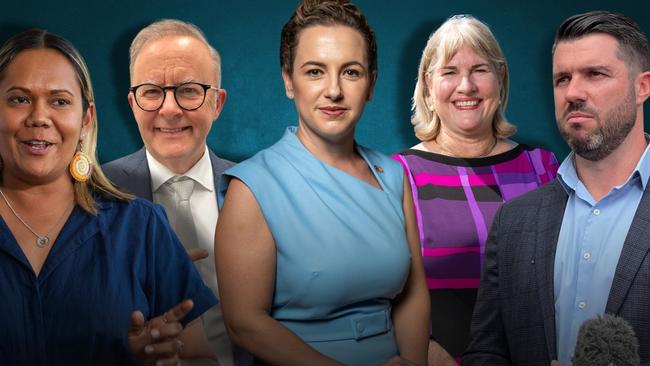
Politics
Don't miss out on the headlines from Politics. Followed categories will be added to My News.
It’s been a big year for Northern Territory politics – a historic election marked the end of Labor’s longtime reign.
There were shocks and scandals aplenty.
Here are the events that defined Northern Territory politics in 2024.
JANUARY – Labor tries to right the ship
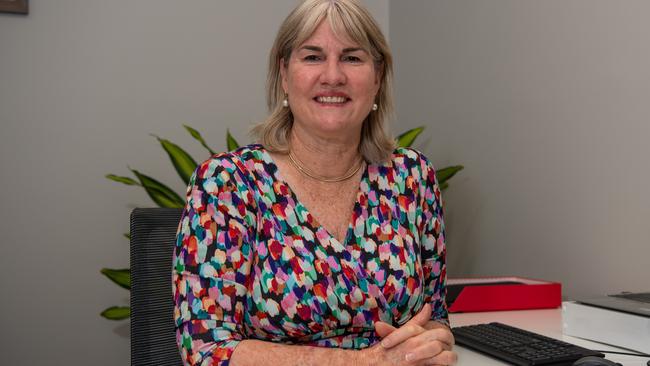
We open the year with Territory Labor reeling from Natasha Fyles’ untimely departure as Chief Minister just a week before Christmas.
While Fyles’ deputy Nicole Manison was expected to take the job, rumours are it was Kate Worden’s defection from her right faction leader that tipped the scales to Eva Lawler.
Lawler set about trying to captain a sinking ship, steering Labor in a direction that was (in her words) less ideological and more commonsense – immediately affirming her support for the gas industry and hinting more prisons could be on the cards.
Manison and Paul Kirby – another former Cabinet minister shuffled to the backbench – announced they would resign from politics at the election.
FEBRUARY – F is for February, floods, failing to give way and financial f*** ups
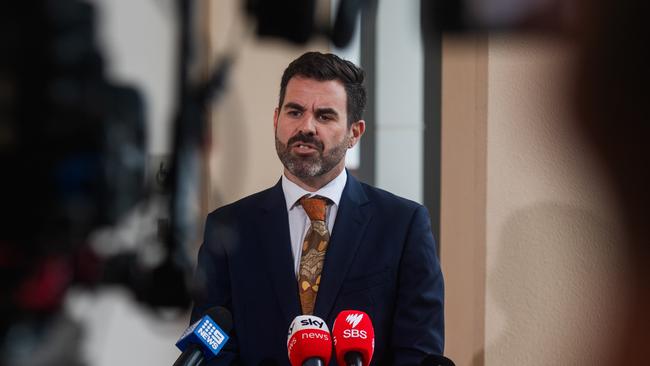
February revealed Deputy Chief Minister Chansey Paech had invested in a company that supplies alcohol to Alice Springs bottle shops two months before grog bans on remote communities lapsed.
Mr Paech, who was a vocal critic of the bans, bought 125 shares in Metcash for $436.60 in May 2022, and divested from his entire share portfolio following the separate share scandal that ended Fyles’ time in the top job.
On the other side of the political aisle, Braitling MLA Joshua Burgoyne was charged with failing to give way after smashing his LandCruiser into a 66-year-old woman’s ute on the Stuart Highway.
He later pleaded guilty to one count of careless driving, and was slapped with a $1650 fine without a conviction.
Meanwhile, widespread blackouts in the Top End exposed the poor policy planning underpinning the Territory’s power supply.
Despite having two of the world’s largest gas reserves within a 500km radius of Darwin, and allowing companies to export millions of dollars of the stuff, the NT government was on standby to use diesel to generate electricity if the Territory ran out of gas.
MARCH – Alice Springs locked down
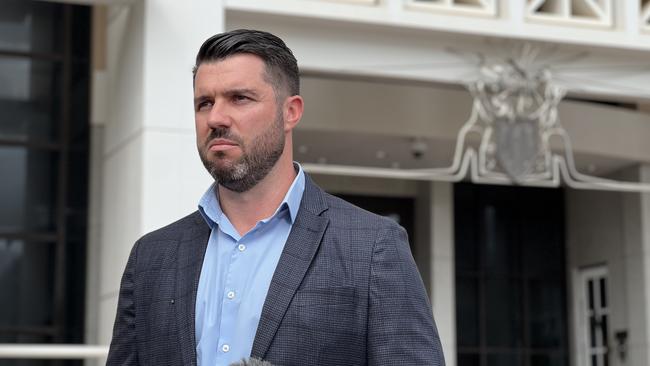
A riot in Alice Springs led the government to impose a snap youth curfew on the town – a measure long opposed by Labor that drew a line in the sand between Eva Lawler and her predecessors.
Police Minister Brent Potter got a harsh reminder the internet is forever when a series of misogynistic, antisemitic, racist and homophobic posts he had previously shared on Facebook resurfaced.
Potter apologised for the “dickhead” posts and said he was a changed man.
Also in March, Federal Cabinet convened in Darwin, drawing Albo and his frontbench to the Top End.
The biggest of several announcements was a historic $1bn commitment to fully fund public schools for the first time in the Territory’s history.
APRIL – Good cop, bad cop
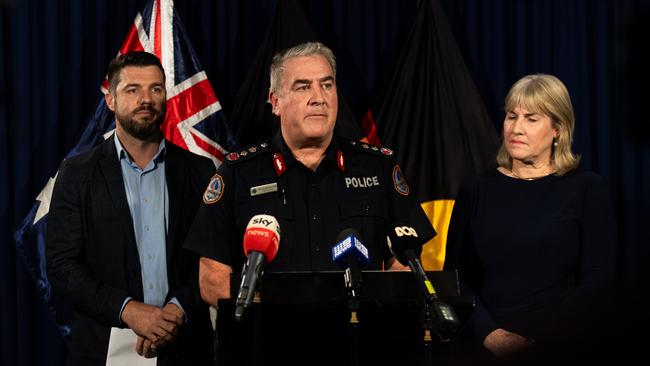
The Kelly police review was released in April, highlighting the unprecedented demands on the Territory force, which was operating in an “increasingly adverse” environment.
The government committed a record $570m to the force over five years.
Cultural issues within NT Police also flared; Commissioner Michael Murphy calling on troops to report ‘systemic’ racism within NT Police, and Indigenous officers lodged a formal, internal anti-discrimination complaint, claiming racism was “alive and well” in the force.
Meanwhile the government signed a secret (possibly multi-billion dollar) deal with Tamboran Resources to supply almost two-thirds of the Territory’s current gas needs for the next decade.
Public hearings for a Senate Inquiry into Middle Arm – the industrial hub where Tamboran’s fracked gas will likely be processed – were held in Darwin, drawing the attention of angry southern pollies from both sides.
MAY – Money talks (and it’s saying IOU)
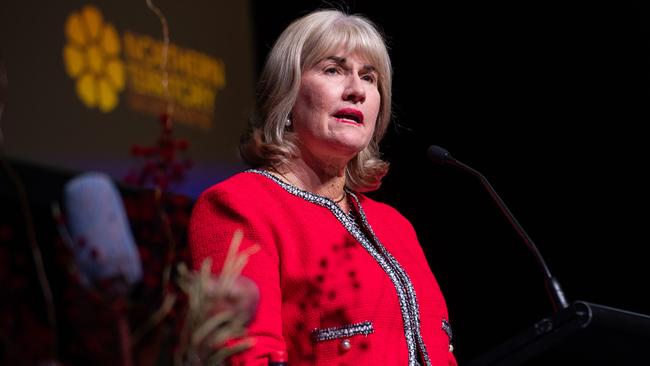
May was budget month, bringing record spending and record debt.
Budget papers revealed Territorians will be paying almost twice as much interest on debt in coming years due to a surge in net debt on the back of record government spending, with debt forecast to hit a historic high of $11.04bn by the end of the next financial year.
More than $2bn in new policy commitments included extra money for police, health and education – though its fair to say not many walked away satisfied with their cut.
In then-Opposition Leader Lia Finocchiaro’s budget reply speech, Territorians were offered the most comprehensive look at what policies it would take to the election.
JUNE – Cracker night crack up and cyclone memorial shit-storm
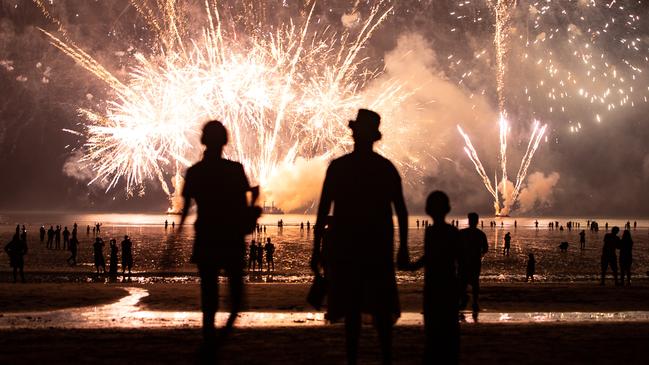
It’s hard to remember a story that has pierced Territorians’ spirit and pride in quite the same way, either before or since: the threat of cracker night being moved from Mindil Beach.
Major Events realised it had not obtained an authority certificate protecting it from being sued if an Aboriginal sacred site at Mindil was damaged during the Territory Day fireworks celebrations.
Notwithstanding the fact such a certificate had never been obtained, now that Major Events knew about it, it was a risk the corporation was not willing to take.
Cue the government promising to bail them out if any sacred site claims were lodged, and rightful order was restored. Viva la Territoire!
In another story small in scope but mighty in emotion, June gave rise to the furore around Darwin’s Cyclone Tracy memorial, with the design first revealed.
Meanwhile, a historic $4bn remote housing partnership was signed, and Barkly council was given the boot following a scathing report.
JULY – It’s beginning to look a lot like an election
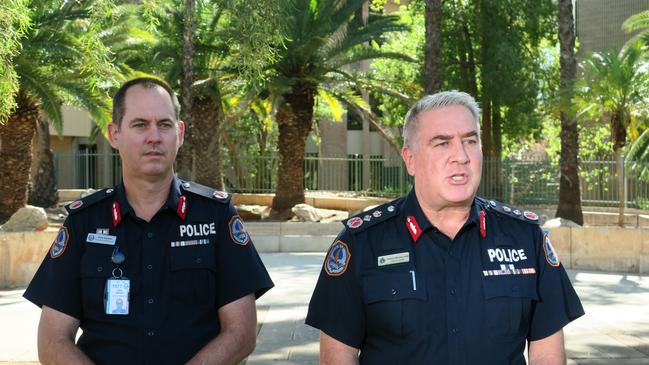
All eyes were back on Alice Springs after a string of horror crimes and an attack on off-duty officers plunged the troubled town into a snap 72 hour curfew.
The curfew coincided with the election campaign kicking up a gear, placing crime at the forefront of many Territorians’ minds.
Crime and the economy dominated discussion at the NT News’ Future NT leaders debate.
Ms Finocchiaro’s promise to “get the Territory pumping again” resonated with donors as CLP fundraising began to dwarf Labor’s.
A third force also emerged, with pollsters predicting independents might make their mark on the new Legislative Assembly.
The end of Dry July revealed another transformation to Territory politics as Labor NT Senator Malarndirri McCarthy was sworn in as the new Indigenous Australians Minister, facing off against her opposing number, CLP’s Jacinta Nampijinpa Price as the shadow minister.
AUGUST – CLP win by a country mile
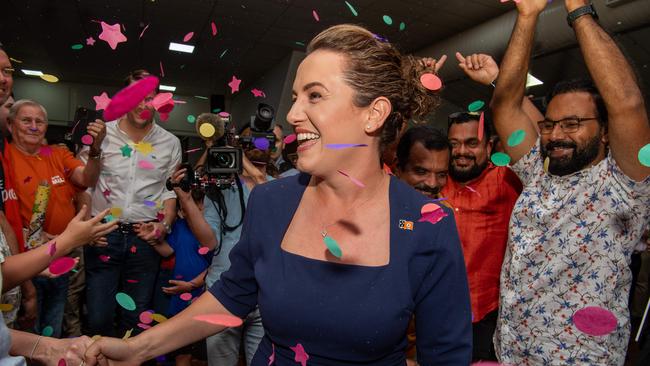
Labor’s only August achievement was (now dubious) psychic croc Speckles’ snap election call their way — it was otherwise CLP dominance on display.
Labor’s eight years in office embarrassingly ended with a Darwin and Palmerston electoral wipe-out and Chief Minister Eva Lawler’s humiliating loss of her own seat.
Returning to her roots, new Chief Minister Lia Finocchiaro claimed her party’s thumping victory at Marrara’s Italian Club.
“Tonight’s result is a victory for hope and opportunity for every single Territorian,” Ms Finocchiaro said.
Labor barely held on to Opposition status, with three independents and a Green joining the crossbench.
With 17 of the 25 Assembly seats, CLP could dominate the Territory’s legislative agenda.
SEPTEMBER – Ch-ch-ch-changes
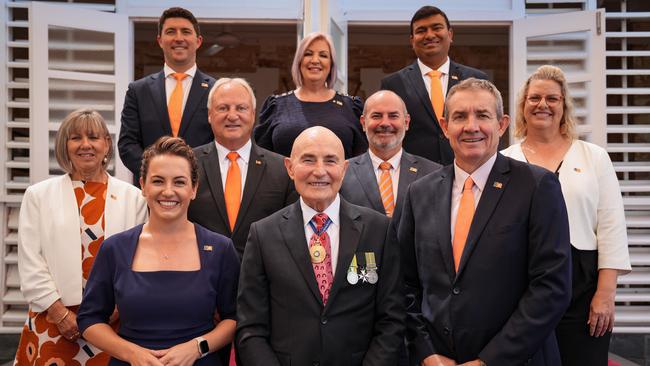
September started with the NT Electoral Commission confirming the Territory’s first Greens member and the departure of former Chief Minister Natasha Fyles from what was once Labor’s safest seat - Nightcliff.
Chief Minister Finocchiaro also revealed her new look CLP cabinet with two first-timers making the ministry.
Ms Finocchiaro set her government’s tone early by lambasting anti-gas protesters at NT Resources Week — telling the mob to “go back to Victoria”.
Labor licked its wounds and announced Selena Uibo as the opposition leader, promising to take a long hard look at itself in the mirror.
No change of government would be complete without a public service shake up, revealing the CLP’s priorities in government
OCTOBER – Tough on crime reforms delivered
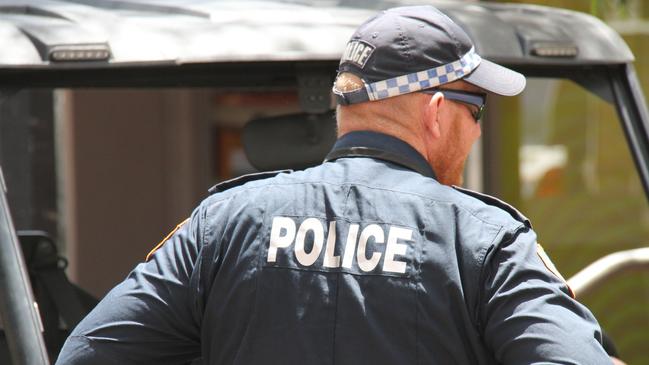
They said they would, and they did, but it didn’t stop outcry from as far as the BBC.
Age of criminal responsibility — lowered.
Posting and boasting — legislated.
Declan’s Law — delivered.
Nuisance public drinking — prohibited.
The suite of tough on crime bills were pushed through a parliament the CLP clearly controlled.
With so many criminals to lock up, the government’s next challenge was where to put them.
Ms Finocchiaro’s government said it was focused solely on the Territory’s crime problem, but elements of the culture wars were beginning to emerge among its ranks.
NOVEMBER — In the nation’s spotlight
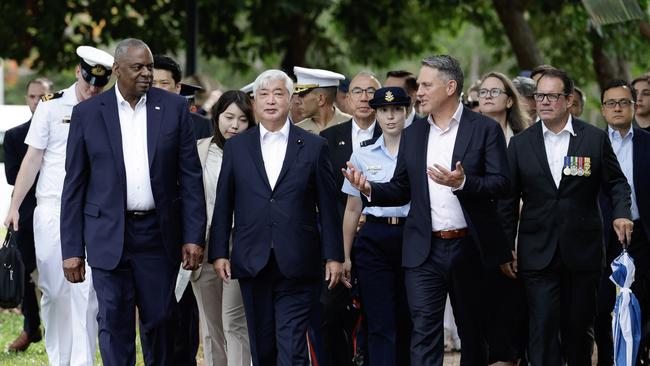
Sweating through the oppressive build up humidity, political heavyweights Lloyd Austin, Richard Marles and Gen Nakatani announced a build up of their own — the stationing of Japanese troops in the Top End, a world first.
This was not the only foreign incursion for the month, with illegal fishermen and Chinese asylum seekers also stepping onto Top End shores, attracting attention from the feds.
Northern Territory coroner Elisabeth Armitage’s landmark coroner’s report was also handed down, labelling the Territory’s domestic violence crisis a “national shame”.
The government also decided November was a good time to get the alcohol flowing again by promising to scrap the minimum floor price.
DECEMBER — Remembering Cyclone Tracy

Ms Finocchiaro channelled the Australian cricket team’s energy and raised her bat to mark 100 days in office.
The celebrations were stalled by an emergency visit to Alice Springs as the nation learned of the shocking assault of an infant.
Her welcome party was far from warm as a fed up local gave her an earful.
Christmas was a time of celebration and commemoration as the Prime Minister Anthony Albanese joined politicians from both sides to memorialise the Cyclone Tracy tragedy of 50 years before.
The Chief Minister used the rendezvous to plead the Territory’s case for more federal support on Red Centre crime.
So what will 2025 bring? You will just have to keep reading to find out.




